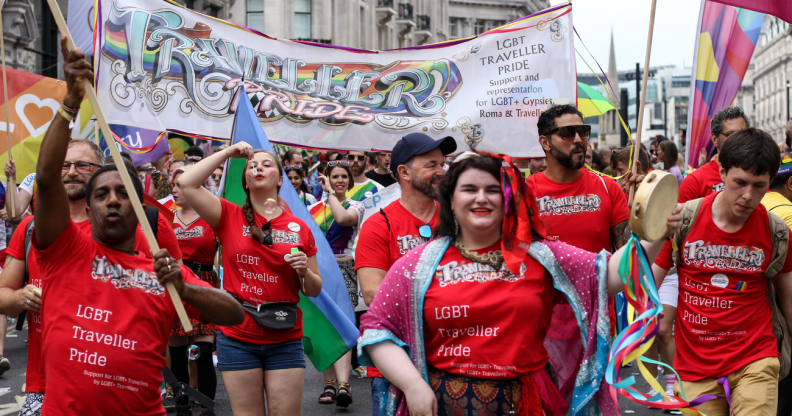This is the constant battle trans Travellers face while living through the pandemic: ‘It’s like how a mouse feels when standing on a trap’

Traveller Pride at Pride in London, 2019 – the first time an LGBT+ GRT group had marched in a UK Pride parade. (Supplied)
A solidarity fund to combat the effect of the pandemic on isolation and mental health has been launched by Traveller Pride to support trans and non-binary Travellers.
Traveller Pride, which made history at Pride in London last year as the first Gypsy, Roma and Traveller (GRT) group to march in a UK Pride parade, announced the new solidarity fund this week.
The UK’s network for LGBT+ Gypsies and Travellers said the trans solidarity fund was aimed at counteracting the negative effects of COVID-19 on people’s wellbeing, especially given the current negative discourse about trans people in the UK and uncertainty for Travellers with “the Home Office’s renewed interest in criminalising Nomadism”.
“The situation for many of us is bleak right now,” said Tyler Hatwell, the founder of Traveller Pride. “There’s a hostility in the air around our identities which is worsened by the isolation and fear due to COVID.
“Many of us have jobs which have been gutted by lockdown and so we’re pleased to be able to offer some tangible services to people in this moment.”
Traveller Pride also announces free, ‘culturally aware’ LGBT+ therapy service.
As well as the trans and non-binary solidarity fund, Traveller Pride is also launching a free therapy service for LGBT+ Travellers, where people can “be heard”.
“A lot of people may be reluctant to engage in therapy,” Tyler said, “worrying that they will be rejected due to their sexuality or because they’re a Traveller. We are first giving free training to any interested therapists to ensure we are getting people with a good level of cultural awareness.”
Trans Travellers can apply for the solidarity fund – with pots of up to £50 per person available – on the Traveller Pride website. The idea is for funds to be used for something material that will help people feel more at ease in themselves, such as binders, packers, make-up, clothes or anything else that makes transitioning more accessible to trans and non-binary Travellers.
James*, a trans man who wished to remain anonymous out of concerns his neighbours would find out he is trans and a Traveller, told PinkNews that being a trans Traveller in the UK right now is like “how a mouse feels when it’s standing on the trap, but hasn’t sprung the wire yet”.
“Any little movement is going to inevitably trip the spring, and we’ll be blamed for not stepping carefully enough, or for being too keen on cheese, rather than putting the blame squarely on the person who chose to convince the public that we’re dangerous vermin, and set the trap,” he said.
Living at the intersection of two minority groups is also “a bit of a lonely feeling”, James added. “There’s a common stat that comfortable, safe, appropriate housing and land could be provided for every Traveller in the UK with a square mile of land. I worked out that, statistically, every trans Traveller in the UK could fit into an average-sized church hall.”
Travellers ‘particularly vulnerable’ during pandemic, government admits.
In April, the government admitted that Travellers are “particularly vulnerable and have the potential to be disproportionally impacted by COVID-19”, but left providing support up to local authorities.
While James told PinkNews he’s been “extremely lucky to be housed in bricks”, his friends and family living roadside or on sites have suffered violence, water supplies being turned off – making it difficult to control the spread of COVID-19 infection – evictions, and “blanket injunctions”, which are when a council bans Travellers from stopping anywhere in the local area, often at short notice.
“Obviously,” he added, “during the pandemic, if you’re not allowed to travel, but not allowed to stop, you quickly end up in sticky legal and practical territory.”
And for Travellers who are also trans, there can also be pandemic-related challenges relating to their gender identity.
“Many trans Travellers who usually wouldn’t spend much time at home with their parents have been crammed back into close quarters with them, which is inconvenient at best and an absolute nightmare if your family isn’t supportive, or don’t know that you’re trans,” he said.
Tyler added that the community-led Traveller Pride hopes that the trans solidarity fund and free therapy sessions will “provide some relief, either a space where you can be heard or something material to help you feel more at ease as yourself which can be so vital at a time when we’re so often stripped of personhood in the popular imagination.”
“As a trans person,” James said, “it can feel very vulnerable and disorienting to be seen ‘wrongly’ by others – not to mention that it’s dangerous, when safety can rely on passing as cis.
“Being unable to get away from other people can really heighten that stress – I know trans men who have gone from binding just at work, to staying in their binder from when they get up at 8am to when they go back to their trailer at bedtime, which is incredibly dangerous, and trans women reporting going through make-up at twice the normal speed, from never getting time alone to go bare-faced.
“Hopefully, the trans solidarity fund will help to cover that kind of expense, as well as maybe providing a bit of a bright spot in a dark time – letting other trans GRT people know that they’re not alone, there are more of us out here, and we want to help them.”

